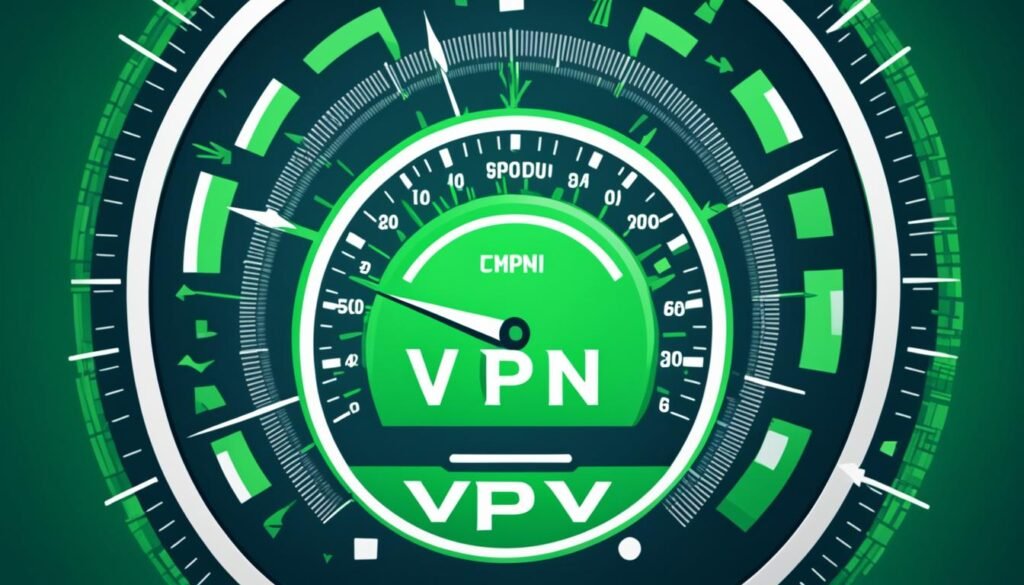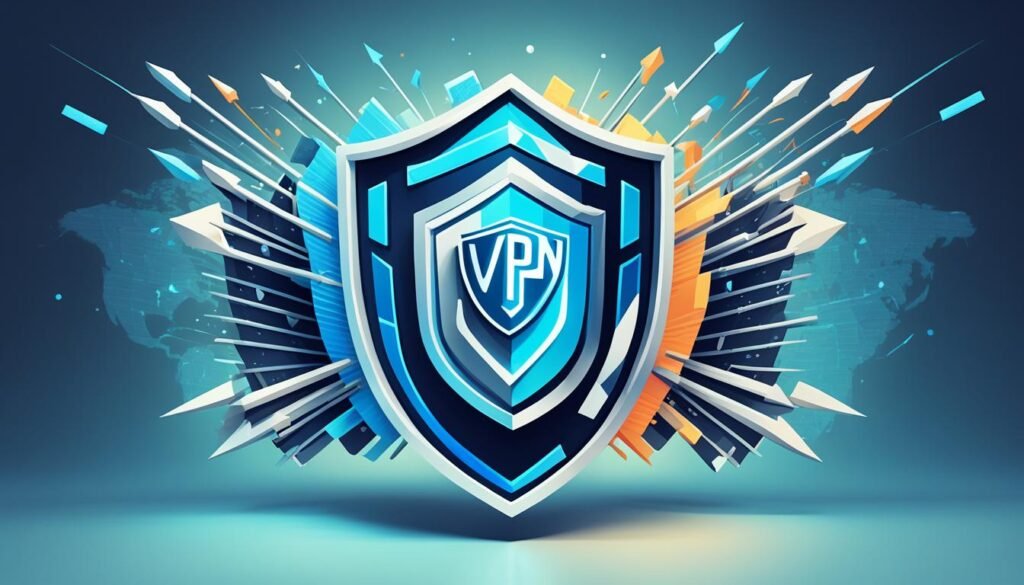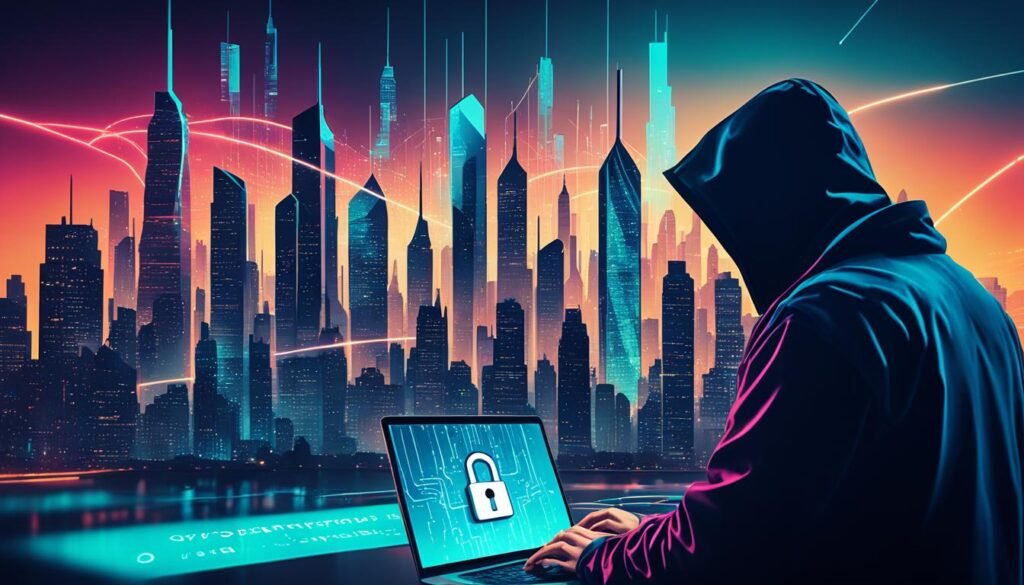Have you ever thought about how to keep your online activities safe in a world full of surveillance?
A Virtual Private Network (VPN) service gives you secure access online by encrypting your data. This means your sensitive info stays private and safe from hackers and cyber threats.
VPNs keep your online activities private, hide your IP address, and encrypt your data. These features let you safely browse the internet, stream global content, and protect your data from prying eyes.
Setting up a VPN is easy with VPN providers or by using VPN routers. When picking a VPN, look at their logging policies, encryption, speed, and server locations. These factors ensure you get the best VPN service.
Businesses gain a lot from VPNs too. They can create secure, fast connections to their offices. They use different VPN types like Site-to-Site, Client VPNs, and SSL VPNs for various needs.
In today’s world, VPNs are essential for protecting your data. They keep your online activities safe, not just for you, but for businesses too. This helps maintain privacy and security worldwide.
What is a Virtual Private Network (VPN)?
A Virtual Private Network, or VPN, is a key tool for keeping your online activities private. It sets up a secure connection over the public Internet. This lets users send sensitive info safely, keeping it safe as it moves through the network.
Definition and Importance
VPNs are essential for protecting your online actions in our digital world. They encrypt your internet traffic, making it unreadable to others without the right key. This stops data from being stolen and keeps your identity hidden by changing your IP address. With growing worries about online spying and data theft, VPNs are more important than ever for keeping your online life private.
How a VPN Works
VPNs work by making a secure tunnel between your device and the VPN server. Here’s how it works:
- A user connects to the VPN, which sets up an encrypted link between their device and the VPN server.
- Data sent through this link is encrypted, keeping it safe and private.
- When it reaches the VPN server, the data is decrypted and sent to its final destination. Your original IP address is swapped with one from the VPN.
This method keeps your data safe, fights off cyber threats, and lets you browse the web anonymously by hiding your true IP address.
Use Cases in Corporate Environments
In businesses, VPNs offer many benefits like better security and more flexibility for remote workers. Companies can use VPNs for site-to-site connections between offices, ensuring safe communication across different locations. VPNs also make it easy for remote workers to access the company network safely from anywhere.
Also, VPNs help cut costs on dedicated communication lines, offering a budget-friendly way to keep networks secure. The encrypted connection VPNs provide keeps company data safe from cyber threats, protecting its integrity.
By using VPNs, companies can beat the hurdles of distance and security, creating a safe and efficient work space.
How VPN Encryption Works
VPN technology relies heavily on encryption to keep data safe. It turns user data into unreadable code using complex algorithms. This makes sure data travels securely, keeping online privacy and sensitive info safe.
The Role of Encryption
Over 50 VPN providers have been tested to see how they handle encryption. VPNs encrypt data to keep internet use safe and protect privacy. This lets users get past government blocks, avoid streaming limits, stop speed slowdowns, and keep their identities hidden, all thanks to strong encryption.
Types of Encryption Used in VPNs
Many encryption methods are used in VPNs:
- Symmetric Encryption: Uses the same key for both making and breaking the code. DES with 56-bit keys is old and not secure, unlike AES.
- AES Encryption: This is a strong encryption with 128-, 192-, or 256-bit keys. AES-256 is safe against hackers.
- Public-key Encryption: Uses a key pair (public and private) to encrypt and decrypt data safely, without sharing the private key.
- Transport Layer Security (TLS): Makes sure data travels safely over networks, which is key for VPN encryption.
Importance of Encryption in Online Privacy
Encryption in VPNs is key for keeping online privacy safe. It protects digital identities and keeps data safe from breaches and spying. NordVPN uses AES with 256-bit keys and three encryption protocols for top security. This means hackers, ISPs, and others can’t see what you’re doing online.
Choosing a VPN with strong encryption like AES-256 means better privacy. Experts worldwide say it’s the best encryption out there. Using these encryption methods with a VPN keeps your data safe and private, even on public Wi-Fi.
Popular VPN Protocols
Choosing the right VPN service means understanding the different VPN protocols. Each protocol has its own strengths in security, speed, and compatibility. Let’s explore the most popular VPN protocols and what makes them special.
OpenVPN
OpenVPN is a top choice for its strong security and flexibility. It uses 256-bit encryption and SSL/TSL tunneling for a secure connection. OpenVPN works with many operating systems like Windows, macOS, Linux, Android, and iOS. It’s great for users who want solid security and good speed.
IKEv2/IPSec
IKEv2/IPSec is known for its speed and reliability. It keeps your secure connection strong even when you switch networks. This makes it perfect for mobile devices. IKEv2/IPSec quickly reconnects after losing your connection, ensuring smooth use.
WireGuard
WireGuard started in 2015 and is quickly becoming popular. It’s known for its modern encryption, offering fast speeds and performance. Even though it’s still being developed, WireGuard is chosen by many VPN providers for its ease and effectiveness. It supports Linux, Windows, macOS, iOS, and Android.
Legacy Protocols: PPTP and L2TP/IPSec
PPTP and L2TP/IPSec are older VPN protocols that are easy to set up and work with many devices. But, they have different strengths and weaknesses. PPTP is the fastest but not the safest due to old encryption and security risks. L2TP/IPSec, made by Cisco and Microsoft in the 1990s, is more secure but slower than newer protocols.
When picking a VPN service, think about what you need most: speed, security, or compatibility. OpenVPN, IKEv2/IPSec, and WireGuard are top picks for most users. They offer a good mix of performance and secure connections.
Impact of VPN on Internet Speed

Using a VPN usually makes your internet slower because your data goes through an encrypted server. But, knowing what affects speed can help keep your VPN fast.
Factors Affecting Speed
Many things can change how fast your VPN is. Server load, encryption strength, and how far you are from the VPN server matter. Encryption is key for security but can slow things down. Being far from the VPN server also slows things down because of latency. Busy servers and times when lots of people use the VPN can also make it slower.
Average Speed Loss with Top VPN Providers
Tests show that good VPNs can slow down your internet by only about 25% on average. NordVPN, for example, only slows things down by 11%. Other top VPNs like ExpressVPN and Surfshark work well too. NordVPN uses WireGuard, which is faster and more efficient than OpenVPN.
VPNs can make Wi-Fi slower by up to 77% when you’re connected. But, the best VPNs have improved their systems to lessen this effect. Here’s a list of some top VPNs:
- NordVPN: 5,000+ servers starting at $4.99 per month
- ExpressVPN: 3,000+ servers, up to 5 devices per subscription
- Surfshark: 3,200+ servers, unlimited devices per subscription
- Private Internet Access: 10,000+ servers, up to 10 devices per subscription
- Hotspot Shield: 3,200+ servers, up to 5 devices per subscription
- CyberGhost: 8,000+ servers, up to 7 devices per subscription
- Hide.me: 1,700+ servers, 1 device in free version, up to 10 in paid version
Balancing Speed and Security
Finding the right balance between speed and security is hard for VPN users. Choosing a VPN with many servers can help keep speeds up. Premium VPNs usually work better than free ones because they have more servers and use better protocols like IKEv2 and WireGuard.
To see how a VPN affects your speed, test your internet with and without a VPN. Upgrading your router, using a wired connection, and picking a nearby VPN server can help. Using split tunneling, which sends some traffic through the VPN, can also make things faster.
Ensuring Online Privacy with VPN Services
In today’s digital world, keeping your online privacy safe is key. VPNs help by hiding your IP address and making your internet use secure. But, they must have strong features and follow strict privacy rules to work well.
IP Masking and Data Protection
VPN’s main job is to hide your IP address. This stops others from knowing where you are or what you’re doing online. It’s important for keeping away from ISPs, anti-piracy groups, and others who shouldn’t see your data.
Encryption is key here. Top VPNs use 256-bit encryption or ChaCha20 to keep your data safe from hackers and ISPs.
No-Logging Policies and Third-Party Audits
A no-logging policy is key for a VPN you can trust. It means they don’t keep any records of your online activities. Third-party checks confirm this, giving you more confidence. Unlike free VPNs that track you for ads, good VPNs focus on keeping your data private and open about how they do it.
Advanced Features for Enhanced Privacy
For those facing big privacy issues, top VPNs have special features. Kill switches cut your internet if the VPN fails, and hiding your VPN use helps get past blocks in some countries. More encryption, like double VPNs or Tor over VPN, adds extra security. Using these together can give you even more protection.
So, a VPN’s success in keeping your online private comes from strong IP masking, no logging, and privacy tools. Choosing a reliable VPN with these features is important for keeping your data safe and in your control.
Considerations for Choosing a VPN
When picking a VPN, think about several key factors. Look at the server network, device compatibility, VPN streaming, and pricing. This helps you find the best service for your needs.
Server Network and Locations
A wide server network is key for accessing content from different places. VPNs with many servers in various countries let you watch global content. This is great for travelers, remote workers, and those who share files online.
Device Compatibility
Make sure your VPN works with all your devices. This includes computers, smartphones, and even gaming consoles. Top VPNs have apps for many operating systems, making it easy to stay private anywhere.
Streaming Capabilities and Unblocking Content
Being able to access streaming sites like Netflix is important. VPNs that can get past geo-blocks let you watch content from anywhere. Look for VPNs with servers optimized for streaming for the best experience.
Cost and Subscription Plans
VPN prices range from $2 to $5 a month, depending on the plan. It’s important to weigh the cost against what you get. Free VPNs might be tempting but they often sell your data. Instead, choose trusted services like TunnelBear, ExpressVPN, SurfShark, and NordVPN. They offer strong privacy and let you use multiple devices at once.
With more people wanting online privacy, picking the right VPN is crucial. It keeps your data safe and lets you enjoy the internet freely.
Setting Up a VPN for Different Devices
Setting up a VPN on various devices ensures your online privacy and security, no matter the platform. It’s crucial to know the best way to set up a VPN, whether you’re on a desktop, mobile, or want coverage for your whole home.
Installation Guides for Windows, MacOS, and Linux
The process to set up a VPN varies across operating systems. For Windows, MacOS, and Linux users, most VPN providers have dedicated client software. This software makes setting up a VPN on different platforms easy:
- Windows: Download the VPN client from the provider’s website, install it, and enter your login credentials to connect.
- MacOS: Access the App Store, search for your VPN provider’s app, download, install, and connect with credentials.
- Linux: Depending on the VPN provider, you might need to use terminal commands or a dedicated GUI app to install and configure the VPN client.
Using VPNs on Mobile Devices
Mobile devices, like Android and iOS, have dedicated VPN apps designed for these platforms. These apps make setting up a VPN on mobile devices easy:
- Android: Navigate to the Google Play Store, install the VPN app, and follow the in-app instructions for setup.
- iOS: Visit the App Store, find your VPN provider’s app, download it, and follow the prompts to configure and connect.
Router Setup for Whole-Home Coverage
For whole-home VPN coverage, setting up your router is a great option. This method is a bit more complex but ensures all devices on your network use encrypted internet. Here’s how to do it:
- Choose a Compatible Router: Make sure your router supports VPN setup, or buy one that does.
- Access Router Settings: Log in to the router’s admin panel using a web browser.
- Enter VPN Information: Put in the VPN server addresses, your login details, and set up the router as your VPN service suggests.
- Connection: Save the changes and connect the router to the VPN.
Setting up a VPN on your router gives you wide coverage but might affect warranties and let you use different servers on each device. Private Internet Access makes this setup easier.
Choosing a VPN for different devices lets you connect multiple devices at once, boosting security and flexibility. Whether you’re on a desktop, mobile, or want whole-home coverage, a good VPN service like ExpressVPN or Surfshark can ensure safe and smooth internet use.
Security Risks and How to Mitigate Them
Today, cybersecurity is key, and knowing VPN risks is vital. The COVID-19 pandemic made more people work from home, increasing VPN use. This has attracted hackers and malware creators. With a huge jump in VPN attacks, it’s clear we must focus on VPN security.
For example, in 2022, a Citrix Gateway SSL VPN service had a big security flaw. Hackers could get past security checks easily. This shows how important strong security is.
Potential Risks of Using VPNs
VPNs help people work remotely but come with problems. They can slow down internet speed, making work hard. Security-wise, VPNs often struggle to keep out unauthorized users.
They can be used on any device, which means risks if that device is not safe. Keeping VPNs updated is hard, especially for big companies. This makes them a target for hackers.
How to Select a Secure VPN Provider
Choosing a secure VPN is key to staying safe. Look for strong encryption and clear rules about how they use your data. Make sure they don’t share your info with anyone.
Also, pick a VPN from a place that respects privacy. Using a zero-trust network access (ZTNA) can make things even safer. Gartner predicts more companies will use ZTNA in 2023.
Additional Measures for Ensuring Security
VPNs are helpful, but more steps can make you safer. Using tools like Splashtop Enterprise or Cameyo can offer security without VPN risks. These tools use the Zero Trust model for better safety.
Adding features like always-on monitoring and controlling device access helps too. Using two-factor authentication (2FA) and machine learning to spot odd behavior can catch threats early. This keeps your online world safer.


